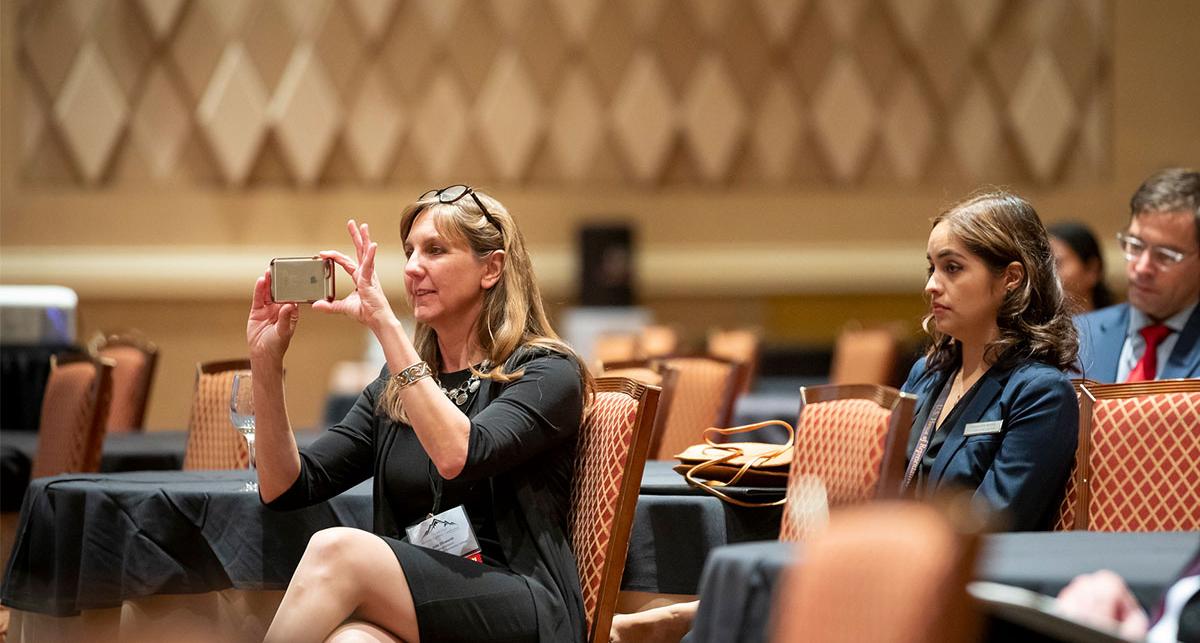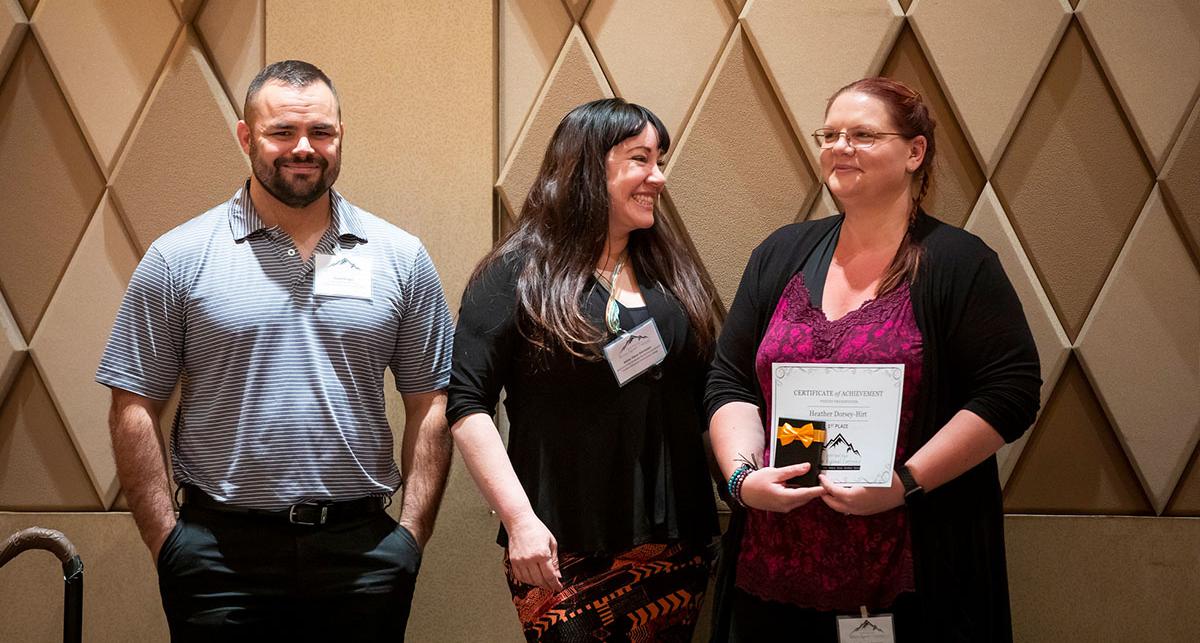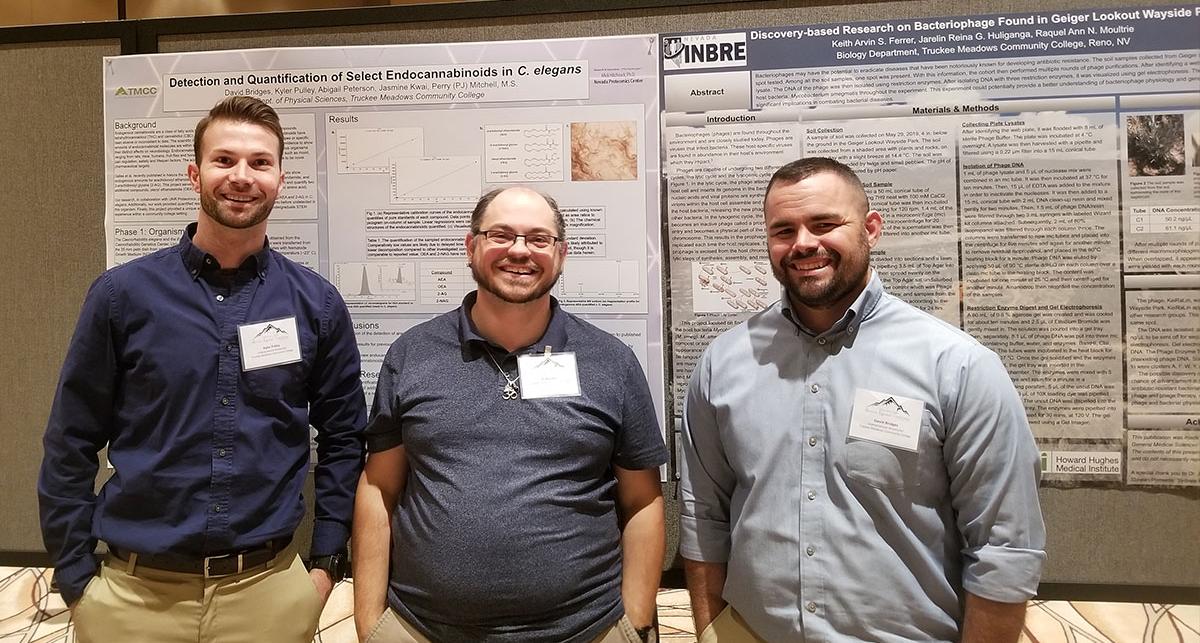
Last week, five TMCC students participated in the NIH IDeA Western Regional Conference, a biennial event that provides opportunities for students and faculty in the sciences to network, to share research and to exchange best practices. The conference, which took place in Las Vegas, included other students, faculty and staff from institutions in Wyoming, Nevada, Alaska, Hawaii, Idaho, Montana, and New Mexico. TMCC students Kyler Pulley, Raquel Ann Moultrie, Heather Dorsey-Hirt, Abigail Peterson and TMCC student worker and alumnus David Bridges had the opportunity to do something most undergraduates don’t: not only did they attend a professional conference, but they presented their own research there.
This is possible due to funding from Nevada INBRE which provides opportunities for TMCC students to conduct research in labs, which gives them critical hands-on research experience. “This conference allowed me the opportunity to talk with leaders in the local scientific community to find out what job opportunities are out there for someone who is in the middle of applying to graduate schools,” said David Bridges, a TMCC student-employee and alumnus who will be graduating with his Bachelor’s from UNR in December 2019.
Undergraduate research, which was once unheard of, is becoming a method by which students interested in pursuing a career in the sciences can take large strides to enter a world where it’s hard to believe they “belong.” “‘Imposter syndrome’ is a real thing that exists with STEM majors,” said Bridges. Yet, by attending the presentations of scientific leaders and understanding their work provides undergraduates like Bridges with a much-deserved confidence-boost.
The conference also included a special poster presentation session for not only graduate students and professionals but for undergraduates as well. “The poster session is an event where posters made by the researchers in attendance are hung up in a large room, and people are given the opportunity to approach you, read about your work and ask you questions [like…] why you believe your work is important and what you think still needs to be done,” said Bridges.
Offering undergraduates the opportunity to participate in a poster session—with awards given to the top three presenters—opens doors into the vast number of opportunities in the sciences for students who are less experienced at showcasing their research in an academic setting.
New Experiences that Build Confidence
Why attend a professional conference? Perhaps the question should be “why not?” Conferences can offer students opportunities to form professional contacts, to gain experience talking about their own work; they look great on a resume and depending on the type of conference, can enable a student to hone their presentation skills.
“Presenting at a conference like this is always exciting,” said TMCC student Abigail Peterson, who presented her research in Bioinformatics titled “Characterization and Genomic Analysis of Mycobacteriophages Lewan and Heathen, Including Host Range Investigation of Phage Heathen,” which she completed with the oversight of TMCC Administrative faculty Tina Slowan-Pomeroy. “I love being able to show someone my research and seeing their excitement about what it could mean, and what I'm planning to do in order to further the research,” said Peterson.
Peterson, who began working with Slowan-Pomeroy as a freshman, conducted this research in a Bioinformatics class. The opportunity to present research early in a student’s academic career is paramount, said Slowan-Pomeroy. “The opportunity to present your research to other students and instructors is important. But the conference included more than that. Students were attending meetings, sitting in on luncheons when the Director of the National Institute of Health spoke. Opportunities like these can open so many doors for our students,” she said.
Raquel Moultrie, who’s entering her second year at TMCC, is a first-generation college student who’s set her sights on becoming a Small Animal Veterinarian Surgeon. The conference was a new experience for Moultrie, who said the experience of attending a professional conference was eye-opening. She attended breakout sessions on Cancer and Bioinformatics; she also participated in the poster session, presenting her research on bacteriophages from the TMCC Summer BioResearch Program she completed last summer. The experience, she said, was incredible. “I felt like a scientist. And, it was cool to see all the different things people are researching. The experience—and all the connections I made with others—those will help me as I work toward my goals,” she said.
Bridges presented a poster that was a result of work completed in a research group with fellow TMCC student Kyler Pulley and TMCC Physical Sciences Instructor PJ Mitchell. The research project, titled “Detection and Quantification of Select Endocannabinoids in C. elegans” was based on work Mitchell completed as a part of his Master’s thesis. “I never got a definitive answer in my thesis,” said Mitchell. “So, I thought it would be a good opportunity to revisit this subject with students.”
The trio studied endocannabinoids—a kind of biomolecule—that many living creatures, including humans, possess. “Finding these molecules in organisms can help us identify what function they may have and can lead to things down the road like pain killers that are as strong as Vicodin, but not as addictive,” said Bridges. “Doing this experiment had many challenges, like trying to schedule lab procedures before our compounds got too old to provide good results, but also taught me a lot about troubleshooting and ingenuity in a lab setting.”
An Unexpected Win
TMCC student Heather Dorsey-Hirt presented a poster based on work she completed in an internship at the National Institute of Health in Washington D.C. where she tested and researched pathogens for the D68 Enterovirus. “Looking at everyone’s research, and asking them questions—that was what was so amazing about this conference: talking to people who are interested in what you’re doing and who know what you’re talking about,” she said. After the poster presentation, Dorsey-Hirt left the conference early and returned to Reno to attend her classes at TMCC.

(From left) David Bridges, Adine Stormoen and Tina Slowan-Pomeroy accepted the first place award in the poster presentation for TMCC Nursing student Heather Dorsey-Hirt.
When she got home, she received unexpected news: out of all the regional poster entries, she won first place. “I thought I might have a chance at placing, but I never thought I’d take first,” she said. Bridges, Slowan-Pomeroy and INBRE Assistant Undergraduate Research Coordinator Adine Stormoen accepted the award on Dorsey-Hirt’s behalf.
“These opportunities can give you a confidence boost, and a different feeling about yourself. This was my third poster presentation, and I got the hang of it... and I thought to myself, ‘maybe I belong here.’”
Next summer, Dorsey-Hirt plans on completing another internship with NIH. Her ultimate goal is to conduct research that will serve areas in the world in need. “Being born [the United States], I think you have an obligation to share your knowledge and resources with those who could benefit from them in other parts of the world,” she said.
Giving the Gift of Science
TMCC is entering its sixth year of offering its students opportunities to engage in research through its participation in SEA-PHAGES (Science Education Alliance-Phage Hunters Advancing Genomics and Evolutionary Science) research through a partnership with Howard Hughes Medical Institute (HHMI). “TMCC is one of the few community colleges involved,” said Slowan-Pomeroy. “Students literally go gather soil samples, and see what phages they can find.” These kinds of opportunities have enabled TMCC students to attend conferences hosted by HHMI, NASA and INBRE poster symposiums, and conferences, among several others.
As a result of these research opportunities, TMCC continues to have a growing community of successful alumni who have found careers in the sciences. Two TMCC alumni, Andrew Tobey and George Mwinnyaa, presented at the statewide INBRE annual meeting (that occurred concurrently with the Western Regional Conference) about how undergraduate research opportunities have helped them in extraordinary ways. Tobey is in the selective post-bac prep program for the UNR School of Medicine, and Mwinnyaa is currently a Ph.D. candidate at John Hopkins University where he studies Public Health. For both, the opportunity to conduct INBRE-supported research as an undergraduate student was vital to their success.
Stormoen believes that encouraging students to participate in these kinds of opportunities is key to their success. “I enjoy helping students take those first steps. I don’t want them sitting on the sidelines,” she said.
For more information about undergraduate research opportunities at TMCC, contact the Biology Department at 775-673-8251 or by email.
Photo credit: UNR Med/Brin Reynolds





